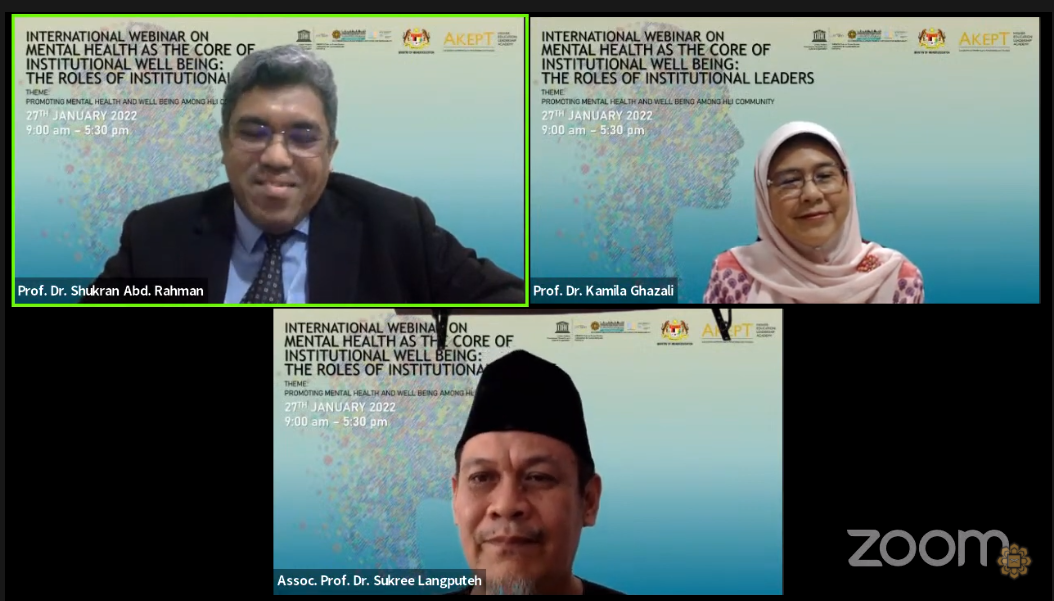By Nurin Nazifa
GOMBAK, 29 January 2022: University leaders need to be competent in tackling psychosocial issues among students, academics, staff members and community at large that arose as a result of COVID-19 pandemic.
This was the view shared at a webinar by two senior academics, Prof. Dr. Kamila Ghazali, the former Deputy Vice-Chancellor (Academic and International) of University of Malaya (UM) and Assoc. Prof. Dr. Sukree Langputeh, the Deputy Rector (International Relation and Alumni) of Fatoni University, Thailand.
Akademi Kepimpinan Pendidikan Tinggi (AKEPT) in collaboration with International Islamic University Malaysia (IIUM) organised a webinar to highlight mental health issues and well-being among communities of higher learning institutions (HLIs).
The first session moderated by Prof. Dr. Shukran Abd. Rahman, the Dean of AbdulHamid AbuSulayman Kuliyyah of Islamic Revealed Knowledge and Human Sciences, discussed mental health-related issues faced by academics during COVID-19 along with the solutions.
Based on her first-hand experience as the Deputy Vice-Chancellor of UM when COVID-19 first arrived in Malaysia, Kamila expressed her concerns if the learning outcome (LO) would still be achieved, if lessons could still be ongoing, and students would not be left behind, and that the mental health of the students was still not the primary importance.
œHowever, my view changed after going through a lot of communication and feedback sessions when I realised the importance of mental health and well-being of staff and students while being totally remote, she said.
Kamila also highlighted the three core competencies that a good leader must have when dealing with crises: Direction, Communication and Outreach or DCO.
She deemed that a clear direction from the management could help to create confidence towards the lecturers and students in ensuring that the university would assist them through the newly acquainted struggle of being in a nationwide pandemic.
œThis can be achieved through a strong and cohesive teamwork while also organising weekly meetings to discuss and give out surveys just to ensure that the university knows which student needs help to create a better learning environment for them, she added.
Besides, a clear direction from management, an effective communication line which promotes inclusivity among the staff, lecturers and students before making a decision, is vital in making sure their opinions are also heard.
To ensure mental health and well-being of students, which are of concern, is taken care of, the outreach can be carried out through various measures, which include providing food for students who are staying on campus, conducting online mental health programmes, and providing contact information to counsellors for those who need to contact them through inclusive communication.
œAs long as people do not judge an individuals mental health and also accept that there are people who need help, they are on the right track, and I believe the university should be a place that is free of judgment where people can seek help, Kamila remarked.
Meanwhile, the Deputy Rector of Fatoni University in Thailand, Dr. Sukree Langputeh, shared his SON strategies in which they are used to assess and manage the mental health and well being among academics.
The SON strategies include three main aspects which are self, organisational and networking strategies, in which all three are important in order to help counter mental health issues among academics.
œSelf strategy functions as the ˜head where the university needs to have adequate information and knowledge to be able to assess the harm that occurs to the courses, faculty and the students personally, Sukree described.
On the other hand, organisational strategy refers to how decision making processes are determined by the Thai government in which doctors or the medical team act as the advisors.
Networking strategy is the connection that the university established with other local and international universities to ensure the courses are run smoothly.
Sukree also emphasised the need to have more mental health professionals in the country – psychologists, psychiatrists, and social workers – to respond to psychosocial issues in which Thailand at the moment only has around 200 psychiatrists which is not enough to accommodate universities and the workplace.
œWhile having knowledge about students mental health, it is also important for the university to discuss how to take care of the well-being of the students and to always think positively about the students to promote better mental health and well-being among lecturers and students, he further stated.
The virtual webinar was held live on Thursday (27 January) from 9 a.m. to 5.00 p.m. via Zoom Meeting and streamed on the YouTube official account of IIUM.***
